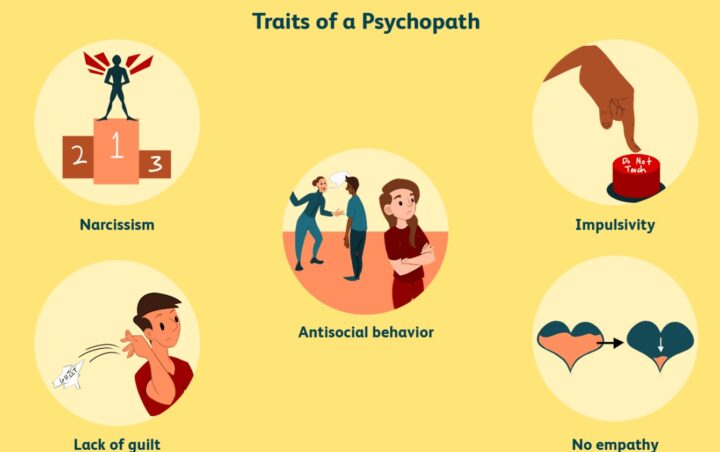20 Subtle Warning Signs of Potential Psychopathy

Hannibal Lecter of “The Silence of the Lambs,” Anton Chigurh from “No Country For Old Men,” Annie Wilkes from “Misery”… You know them (and maybe even love them a little), these are a few of the most famous psychopaths of popular culture.
When we think of the word ‘psychopath,’ most of us get images of deranged serial killers that get a kick out of hurting people. But the truth is there’s a lot of misconception around the concept of psychopathy in society. For one, it is not recognized as an official mental health disorder: the latest edition of the Diagnostic and Statistical Manual of Mental Disorders (DSM-V) mentions it as a subtype of antisocial personality disorder, previously referred to as sociopathy.
What is antisocial personality disorder?

Personality disorders are a group of mental health conditions in which a person has longstanding patterns of rigid and unhealthy thoughts and behaviors. People who struggle with personality disorders have a hard time dealing with other people because of their inflexible view of the world. In many cases, they find it difficult to participate in social activities.
Experts estimate that around 10% of the US population has a personality disorder. There are several types, including antisocial, borderline, histrionic, narcissistic, and obsessive-compulsive personality disorder. Research suggests that antisocial personality disorder (ASPD) affects about 4% of US adults.
Like other personality disorders, ASPD is marked by a long-term pattern of thoughts and behaviors that significantly interfere with functioning. People who have antisocial personality disorder have a general disregard for social norms and are inconsiderate with the rights of others. It is also not uncommon for them to engage in criminal activity and impulsive, reckless, and sometimes violent behaviors.
What are psychopathic traits?

While psychopathy is not a mental health condition, per se, psychologists acknowledge that there are people who exhibit psychopathic traits without necessarily meeting the criteria for an ASPD diagnosis. In fact, one study showed that nearly 30% of the population has at least 1 psychopathic trait, but less than 1% fit the definition of ASPD. According to BetterHelp, neurological issues, genetics, and environmental factors are part of what determine psychopathic traits.
There isn’t a firm definition of what constitutes a psychopathic trait. However, there are several signs that might indicate a predisposition towards antisocial behaviors. Here are 20 behaviors to look out for:
Disregard for rules and norms: this may include minor offenses like inappropriate comments or vandalism, or more serious crimes such as robbery and assault.
Cold and detached: not displaying any emotions unless it serves them.
Opportunistic empathy: only caring about other people’s feelings when it’s convenient for them.
Impulsivity: acting on a whim or displaying unnecessarily risky behavior.
Superficial charm: weaponizing flattery and attention to get what they want.
Lack of remorse: may understand that what they did was wrong but don’t care how their behavior affected others.
Selfishness: not caring about the feelings of others, not “getting” why someone is upset or offended.
Constant boredom: people with this trait have a frequent need for stimulation. They may engage in unhealthy or risky behaviors because they enjoy the thrill.

Pathological lying: lies even in unnecessary situations to look good in front of others and get out of trouble. Some people with this personality trait also lie because they enjoy it or because they “can.”
Manipulation: using devious means to get others to do what they want. People with this personality trait seek to create an imbalance of power to gain power, control, or benefits at someone else’s expense.
Leans towards a parasitic lifestyle: those who have psychopathic traits usually seek to live off of others. They usually resort to victimization to make other people feel sorry for them in order to take advantage of them financially.
Poor emotion control: being explosive and aggressive even over little things, often to the point of frightening others.
Gaslighting: trying to convince others that they are “crazy” or “paranoid” to control and manipulate them.
Narcissism: people with psychopathic traits are usually very narcissistic and may even suffer from delusions of grandeur, such as believing they are smarter, more attractive, more powerful, etc., than everyone else.
Promiscuous sexual behavior: since they get bored easily, people with psychopathic traits may engage in promiscuous sexual behavior and are likely to be chronic cheaters.
Lack of realistic goals: delusions of grandeur and a preference towards a parasitic lifestyle may lead someone with psychopathic traits to set unrealistic goals, like becoming a millionaire or famous overnight, though they rarely follow through.
Lacks inhibitions: people with this trait don’t care about social norms or find them “pointless,” so they offend and disrespect others easily.
Thinks they are never wrong: not believing they can make mistakes because they believe they are somehow superior to others.
Hostile and oppositional: tends to display excessive anger and violence no matter who they’re with or where they’re at.
Rarely accepts responsibility: always blaming other people or circumstances for their mishaps. Never apologizes or think they were wrong.
To wrap things up

It’s fair to say that most of us have shown at least one of these traits before. In fact, many of these behaviors are common during adolescence — which teen isn’t impulsive and a little detached from time to time, right? So it’s important to keep in mind that what we generally recognize as psychopathy means that a person is exhibiting these traits or tendencies over and over again.
If you are worried you or a loved one may have ASPD or psychopathic traits, it’s important to share your concerns with a mental health professional. In most cases, people who receive the appropriate support for their specific situation can lead fully functional, happy lives.

